
- Online Course

20 Great MBA Application Essay Samples (With Links)
Want to ace your MBA application? A stellar essay can be your golden ticket.
With elite business schools like Harvard and Stanford boasting acceptance rates as low as 10% and 6% respectively, every aspect of your application counts. While GPA and GMAT scores matter, your essay can be a game-changer. Recognizing its weight, we’ve gathered top-notch MBA essay samples, endorsed by admission committees from premier institutions. Dive in and let’s craft that standout application!
What is an MBA Application Essay?
An MBA application essay is a detailed write-up about your personal and professional goals and aspirations. It also explains how the MBA program will help you attain your objectives for the future. Your essay is your one shot to convince the admission committee to consider you for the initial interview.

What Admission Committee Look for in an MBA Essay?
- Academic ability
- Impressive work experience
- Career Course
- Authenticity of goals
- Competencies, leadership , dedication, challenges, and growth
- The right reason for pursuing an MBA
- Your compatibility with the culture in which the program is being offered
If you want to learn more, here is the complete guide on how admission committees process MBA applications.
20 Great MBA Applications Essays Samples
Now you have known that what makes a great MBA admission essay, the next step is to write one for yourself. Before writing, check out this list of expert-vetted MBA application essays that secured admissions to top-rated business schools in the world. Admission consultants have shared these samples and they can be helpful if you read and analyze them carefully. If you’re completely unsure about how to get started, there are also custom essay writing services that can help you structure your essay with the help of professional editors.
Sample 1: Leadership-focused MBA application essay
This sample is particularly focused on leadership traits. If your essay is about explaining your leadership quality experience, this sample is right up your alley. The best thing about the essay is that it is written in a simple, engaging, and humorous style. It defines a great experience in a very conversational style.

Sample 2: Self-focused MBA application essay
If you are asked to write about your strengths, weaknesses, aims, and goals in your application essay, this sample will help you. The applicant who wrote this got accepted to the INSEAD business school. It doesn’t merely describe her strengths and weaknesses, but it presents a complete picture of herself as a person. It highlighted the events and incidents that shaped her personality.
Sample 3: Life-hardships-focused MBA application essay
If you want to explain your life’s hardships and the events that turned you into an ambitious person, this sample is for you. In this application essay, the candidate has defined three phases of his life and how he survived through each adversity. He beautifully explained why the MBA program is important to his future.
Sample 4: Continuous growth and learning-focused MBA application essay
This essay was submitted to Harvard Business School. The best thing about this piece is that the writer has explained her learning and professional development journey in a very sequential and engaging manner, which is truly admirable. A useful thing to remember about the MBA essays included in this list is that you can merge them into a single printable and perfectly formatted file with Sodapdf or another PDF editor. Having all of them stored in a single PDF is going to be quite helpful when it’s time to write your piece. But guess what? There are more examples to explore below, so let’s keep going…
Sample 5: Best MBA application essay for low scorers
Have a low GPA? What would you write about academics in an MBA essay to convince the admission committee? Do not overthink! MBA essay is not all about high achievements and sterling background. It is also an opportunity to atone for your past mistakes. This MBA essay was written by a student who obtained very low academic grades, yet got admitted to her desired business school. Her turning point? A powerful application essay.

Sample 6: A guitarist’s application essay for the MBA program
Suppose you are ambitious in a skill or profession that has nothing to do with the MBA program, yet you need the degree for certain reasons. How would you showcase that irrelevant skill in your MBA application essay? This sample essay will show how you how. A guitarist who got selected for the MBA program wrote this one. The applicant has intelligently defined his passion for guitar as a way of developing discipline, determination, leadership, and success. He explained how his passion affected his academics and how the guitar helped him cope with the challenges.
Sample 7: An engineer’s essay for MBA application
If you come from a technical or engineering background and have the ambition to pursue an MBA degree to boost your engineering career, this sample essay will help pave the way for you. This essay was submitted by a mechanical engineer to Harvard Business School. The writer explained how his engineering experience motivated him to pursue an MBA and how the program is important to his long-term goals.
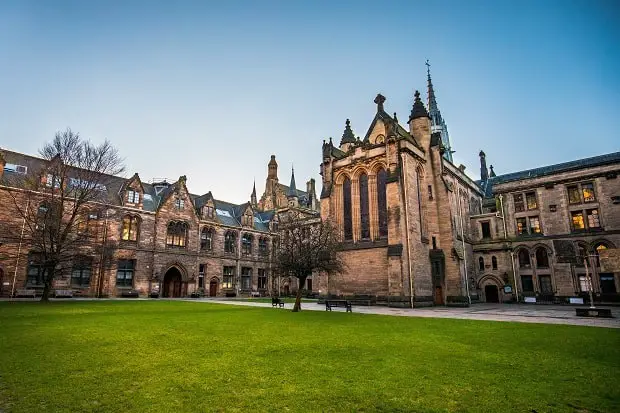
Sample 8: Harvard Business School MBA essay
This essay was written by a candidate who got accepted to Harvard Business School. Check it out to know what the prestigious academic institution looks for in your essay.
Sample 9: Wharton Business School MBA essay
This essay has been honored as one of the best MBA essays ever received by the Wharton Business School in Pennsylvania. Check out the structure, organization, and flow, and adapt the same to your essay.
Sample 10: Columbia Business School MBA essay
The Columbia Business School’s admission committee shared this MBA essay. They explained why the applicant who wrote this was instantly accepted to the program and why they appreciated its content.
Sample 11: Stanford Graduate School of Business MBA essay
This essay was written by a candidate who got accepted to Stanford Business School for an MBA. If you are aiming to get your MBA at Stanford, this sample will give you a deep understanding of what convinces the esteemed school’s admission committee to accept applicants into their fold.
Sample 12: University of California Business School MBA essay
This sample was taken from a pool of successful MBA application essays submitted to the University of California business school. Read it carefully and analyze its structure, words, and substance before you compose your own fantastic MBA essay.
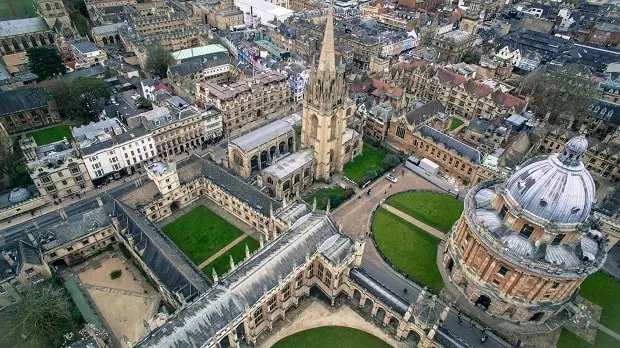
Sample 13: University of OXFORD business school MBA essay
If Oxford Business School is your target destiny for earning your MBA, then check out this outstanding application essay. The person who wrote it managed to grab the admission committee member’s attention.
Sample 14: London Business School MBA essay
This essay was written by a candidate who got accepted to the London Business School. The school’s admission consultant shared this sample as a reference to other MBA aspirants. This piece will specifically help you understand the tone, writing style, formatting, and overall flow of the MBA application essay that meets the school’s standards.
Sample 15: A goal-oriented MBA application essay
Sometimes the MBA admission portal may demand an essay specifically focused on your future goals. In such a case, you must be very sure about yourself and must convey your goals and future directions based on your experiences and planning. Check out this sample to get an idea of how a successful candidate writes about personal goals.
Sample 16: Executive MBA essay
This successful MBA application essay was submitted to the MIT Sloan Executive MBA Program. EMBA essay requires you to show strong potential, impact, leadership, and the ultimate need for the program. Read this essay if EMBA is on your horizon.

Sample 17: MBA video essay
Many business schools are turning to video-based essays for MBA applications. A video-based essay is a better option to express yourself directly to the admission committee. A successful candidate for the Kellogg School of Management submitted this sample. Listen to the video and appreciate how beautifully the applicant has explained his journey from beginning to end. Want to learn more about video MBA essays? Here is a complete guide.
Sample 18: Short-answer-based MBA application essay
Some business schools require candidates to respond to short questions to get insights into their personalities and suitability for the MBA program. More or less, most of the questions revolve around the same theme. The key to success is to grasp the intention of the admission committee behind the questions and to stick to your identity . These successful answers submitted to the Tepper School of Business will help you in formulating your answers.
Sample 19: MIT Sloan School of Management
This essay was submitted by a successful candidate for the MIT Sloan School of Management MBA program. See how this applicant smartly answered the essay questions.
Sample 20: Michigan Ross School of Business MBA program
The Michigan Ross Business School asks a diverse range of questions from candidates to analyze their competencies from multiple perspectives. If Michigan Ross is where you intend to get your MBA, this essay submitted by a candidate who got admitted to the school’s MBA program will help keep you on track.
What Should be Included in the MBA Application Essay?
- Your background: What shaped you into what you are now? Including ethnicity, obstacles, and struggles.
- Self-reflection: Your values, characteristics, strengths, and weaknesses.
- Your goals : How do you envision your future?
- Aspirations: Why MBA is important to you and how this program will help you in shaping your future?
- Justification: If you have low academic grades, explain the reasons you did not do well and what you learned from it.
- Experience and achievements: What have you achieved so far?
These are the significant components of an MBA essay. Just adjust the sequence, play with words, and come up with a persuasive yet realistic picture of yourself.

What Makes a Great MBA Application Essay?
- Be school-specific. Explain why you are passionate about the MBA program of the school to which you’re applying.
- Avoid edition. Write simply and engagingly. Let the reader read a meaningful story about you.
- Make it 100% typo-free. Grammatical errors and typos will ruin your essay. Apply standard essay format and structure guidelines , scan your piece several times for errors, get it reviewed by an expert, and present a very professional piece to the admission committee.
- Be original. Do not copy-paste from any source. Strictly follow plagiarism guidelines.
- Write an overwhelming introduction to urge the reader to keep reading and conclude your essay with a strong declaration.
- Be authentic. Write what you are, not what the committee wants to read.
- Be concise, as many schools impose a limit on the essay word count .
Do you want more tips? Here is a complete guide to writing a compelling MBA application essay.
The application essay is a core part of the admission process in the increasingly competitive MBA program. If you do not want to miss the chance of getting selected, you need to know what will make your essay stand out . The expert-vetted list of MBA application essay samples we cited here worked for the top business schools. Learn them by heart, and who knows, it may work for you too. Put your other activities aside, read and analyze the list carefully, and start writing your MBA essay to land in your dream business school.

Digital marketing course: Join my full AI Marketing course, with over 6h and 30 minutes of video lessons and 5 bonuses and learn the skills necessary to thrive as a marketer in the digital era.

Rafal Reyzer
Hey there, welcome to my blog! I'm a full-time entrepreneur building two companies, a digital marketer, and a content creator with 10+ years of experience. I started RafalReyzer.com to provide you with great tools and strategies you can use to become a proficient digital marketer and achieve freedom through online creativity. My site is a one-stop shop for digital marketers, and content enthusiasts who want to be independent, earn more money, and create beautiful things. Explore my journey here , and don't miss out on my AI Marketing Mastery online course.
Recently viewed courses
Recently viewed.
Find Your Dream School
This site uses various technologies, as described in our Privacy Policy, for personalization, measuring website use/performance, and targeted advertising, which may include storing and sharing information about your site visit with third parties. By continuing to use this website you consent to our Privacy Policy and Terms of Use .
COVID-19 Update: To help students through this crisis, The Princeton Review will continue our "Enroll with Confidence" refund policies. For full details, please click here.
20 Must-Read MBA Essay Tips

Business school admissions committees care about more than (just) your GMAT scores and GPA —they want to know who you are and why you belong in their program . Your MBA essays are your best chance to sell the person behind the résumé. They should tie all the pieces of your business school application together and create a comprehensive picture of who you are, what you've done, and what you bring to the table. Here's a roundup of our best MBA essay tips to keep in mind as you begin to write.
How to Write an Unforgettable B-School Essay
1. communicate that you are a proactive, can-do sort of person..
Business schools want leaders, not applicants content with following the herd.
2. Put yourself on ego-alert.
Stress what makes you unique, not what makes you number one.
3. Communicate specific reasons why you're great fit for each school.
Simply stating "I am the ideal candidate for your program" won't convince the admission committee to push you into the admit pile.
Read More: Find Your Business School
4. Bring passion to your writing.
Admissions officers want to know what excites you. And if you'll bring a similar enthusiasm to the classroom.
5. Break the mold.
Challenge perceptions with unexpected essays that say, "There's more to me than you think."
6. If you've taken an unorthodox path to business school, play it up.
Admissions officers appreciate risk-takers.
7. Talk about your gender, ethnicity, minority status or foreign background....
But only if it has affected your outlook or experiences.
8. Fill your essays with plenty of real-life examples.
Specific anecdotes and vivid details make a much greater impact than general claims and broad summaries.
9. Demonstrate a sense of humor or vulnerability.
You're a real person, and it's okay to show it!
BONUS: Don't Make These MBA Essay Mistakes
1. write about your high school glory days. .
Admissions committees don't care if you were editor of the yearbook or captain of the varsity team. They expect their candidates to have moved onto more current, professional achievements.
2. Submit essays that don't answer the questions.
An off-topic essay, or one that merely restates your résumé, will frustrate and bore the admissions committee. More importantly, it won't lead to any new insight about you.
Attend UNC's top-ranked online MBA program without putting your career on hold. See how.
3. Fill essays with industry jargon.
Construct your essays with only enough detail about your job to frame your story and make your point.
4. Reveal half-baked reasons for wanting the MBA.
Admissions officers favor applicants who have well-defined goals. However unsure you are about your future, it's critical that you demonstrate that you have a plan.
5. Exceed the recommended word limits.
This suggests you don't know how to follow directions, operate within constraints or organize your thoughts.
6. Submit an application full of typos and grammatical errors.
A sloppy application suggests a sloppy attitude.
7. Send one school an essay intended for another—or forget to change the school name when using the same essay for several applications.
Admissions committees are (understandably) insulted when they see another school's name or forms.
8. Make excuses.
If your undergraduate experience was one long party, be honest. Discuss how you've matured, both personally and professionally.
9. Be impersonal in the personal statement.
Many applicants avoid the personal like the plague. Instead of talking about how putting themselves through school lowered their GPA, they talk about the rising cost of tuition in America. Admissions officers want to know about YOU.
Read More: How to Ace Your MBA Interview
10. Make too many generalizations.
An essay full of generalizations is a giveaway that you don't have anything to say.
11. Write in a vacuum.
Make sure that each of your essays reinforce and build on the others to present a consistent and compelling representation of who you are, what you've done, and what you bring to the table.
Practice for the GMAT
Take a GMAT practice test with us under the same conditions as the real thing. You'll get a personalized score report highlighting your strengths and areas of improvement.
START A FREE PRACTICE TEST
- Business School

Find MBA Programs Matched to Your Interests
Explore our featured business schools to find those that are looking for students like you.

Top Online MBA Programs
On a mission to increase your salary? Our Top 50 Online MBA ranking is based on academics, career outcomes, tech platforms, and more.

Best Career Prospects
Find out which schools have the best track records for getting students jobs—and the highest starting salaries.

Top Schools for Entrepreneurship
Ready to build your own business from the ground up? Check out these 50 graduate programs.

Free MCAT Practice Test
Thank you! Look for the MCAT Review Guide in your inbox.
I already know my score.

Enrollment Advisor
1-800-2REVIEW (800-273-8439) ext. 1
1-877-LEARN-30
Mon-Fri 9AM-10PM ET
Sat-Sun 9AM-8PM ET
Student Support
1-800-2REVIEW (800-273-8439) ext. 2
Mon-Fri 9AM-9PM ET
Sat-Sun 8:30AM-5PM ET
Partnerships
- Teach or Tutor for Us
College Readiness
International
Advertising
Affiliate/Other
- Enrollment Terms & Conditions
- Accessibility
- Cigna Medical Transparency in Coverage
Register Book
Local Offices: Mon-Fri 9AM-6PM
- SAT Subject Tests
Academic Subjects
- Social Studies
Find the Right College
- College Rankings
- College Advice
- Applying to College
- Financial Aid
School & District Partnerships
- Professional Development
- Advice Articles
- Private Tutoring
- Mobile Apps
- Local Offices
- International Offices
- Work for Us
- Affiliate Program
- Partner with Us
- Advertise with Us
- International Partnerships
- Our Guarantees
- Accessibility – Canada
Privacy Policy | CA Privacy Notice | Do Not Sell or Share My Personal Information | Your Opt-Out Rights | Terms of Use | Site Map
©2024 TPR Education IP Holdings, LLC. All Rights Reserved. The Princeton Review is not affiliated with Princeton University
TPR Education, LLC (doing business as “The Princeton Review”) is controlled by Primavera Holdings Limited, a firm owned by Chinese nationals with a principal place of business in Hong Kong, China.

Which program are you applying to?
Mba personal statement examples.
Get accepted to your top choice business school with your compelling essay.
MBA Personal Statement Sample Essays & Tips
Your academic record, GMAT scores, and GPA are important factors in the MBA application process. But, more than that, business schools ultimately care about who you are and whether you would be a good fit for their program. This is where your application essays come in. The goal here is to complete the picture that your scores and stats began sketching. Take your time when writing these essays. They will form the image the admissions committee will see before they meet you at your interview. Write, edit, and edit again. Be sure there are no spelling or grammatical errors in your essay. You want your portrait to be clean and clear. Once you are satisfied with your essay, ask a trusted friend, mentor, or admissions pro to read it. A fresh pair of eyes can often see things that you can’t.
7 tips for creating the best MBA essays
Here are some important things to remember when writing your MBA essays.
- Show who you are in a background essay Use this opportunity to reveal your values and personality, the obstacles you’ve overcome, and the seminal experiences that have shaped you into the person you are today. No two people have the same history. Use stories and examples to make your background bright and stand out to demonstrate what makes you special. Discuss how your history has brought you to this point. What is there in your background that compels you to pursue an MBA at this time?
- Show your direction in the goals essay Use this opportunity to show that you have clear direction and purpose based on experience and planning. Business school is not another opportunity to “find yourself.” Even if you have had one career path and will use your MBA to launch another career, this essay must describe the reasons behind your career-change, your new goals, and how the program will help you achieve them.
- Use your optional essay to explain negatives in your stats If your GPA was lower than you would have liked early in your undergraduate education, use your essay to show how you learned from this experience. Everyone makes mistakes. How you deal with your mistakes shows a lot to the admissions committee – determination, discipline, success, resilience, and breadth of experience are qualities that will serve you well in your MBA studies and later in life. Be sure that you explain your negatives and don’t try to justify them. Show that you understand the mistake you made, learned from it and changed as a result of processing the experience. That response shows maturity. Justifying – instead of learning or changing – is a sign of immaturity. MBA programs want mature adults. Almost all of them have made mistakes.
- Say what you mean, and mean what you say Admissions committees read thousands of essays during each admissions round. A concise, well thought-out essay will have them reading yours to the end. You need examples and stories to support your statements and make your essay interesting and readable. Each of these needs to be to the point. These professionals are trained to spot an essay that is full of fluff and without substance.Avoid rambling and the use of keywords that you think the reader wants to see. A non-substantive essay will lead the reader to conclude that you, too, are without substance.
- Find your passion This relates to tip #4 above. You want to grab the reader right away and create an essay that will keep their attention to the very end – and leave them wanting to meet you and get to know you even better. In other words, offer you a coveted interview! Find a theme, and weave it throughout your essay. If you can identify a passion that you had from an early age and follow it through the different stages of your life, you will have an interesting, readable essay. Connect your passion to your childhood and you professional and extracurricular experiences and accomplishments. Demonstrate how your passion will influence your future career and serve the community at the school you want to attend.
- Focus on your professional experience and achievements Not everyone has a passion that they have carried with them throughout their life. However, since you are planning on attending an MBA program, you must have had professional and personal achievements. Highlight your professional skills and successes, as well as personal accomplishments. Show how these experiences and achievements have brought you to this point, and how they have influenced your long-term plans and reasons for pursuing an MBA.
- Highlight your experience in your EMBA essay An applicant to an Executive MBA program is an executive or manager currently in the workforce, usually with at least eight years of business experience. As an EMBA student you will be expected to excel in your coursework while continuing to hold down your full-time job. You must demonstrate significant leadership, impact, potential, and the legitimate need for the degree to be accepted. Highlight your current responsibilities and recent achievements, as well as your skill sets. Discuss your goals and how an EMBA will help you reach them. Include how you will positively impact the community at the program you are applying to.
Read MBA Personal Statement Examples
Now that you have the tools to write your compelling essay, check out our sample MBA application essays to see what you will be able to accomplish.
GET ALL THE SAMPLE ESSAYS IN ONE CONVENIENT PDF!
BONUS: You'll also receive a free copy of our popular guide, 5 Fatal Flaws To Avoid in Your MBA Applications Essays.
Get Expert Help With Your MBA Application
Our world-class team helps you stand out from the competition and get accepted.
APPLICATION STRATEGY / ESSAY REVIEW / INTERVIEW PREP
TOP 10 BUSINESS SCHOOLS
HAVE AN AVERAGE ACCEPTANCE RATE OF 10.25%.

A STRONG BUSINESS SCHOOL APPLICATION ESSAY WILL MAKE YOU STAND OUT FROM THE CROWD
You want to get into a top business school, but you need to stand out from the tens of thousands of other impressive applicants. According to US News, the average top 20 b-school acceptance rate is 12.37%, but our MBA clients enjoy an 84% ACCEPTANCE RATE . How can you separate yourself from the competition successfully? By crafting an excellent application essay.
Our clients gain acceptance to...

MIT, Kellogg, HAAS, Tuck, Columbia, NYU and many other business schools.
Get Accepted! Speak with an admissions expert today!
About Stanford GSB
- The Leadership
- Dean’s Updates
- School News & History
- Commencement
- Business, Government & Society
- Centers & Institutes
- Center for Entrepreneurial Studies
- Center for Social Innovation
- Stanford Seed
About the Experience
- Learning at Stanford GSB
- Experiential Learning
- Guest Speakers
- Entrepreneurship
- Social Innovation
- Communication
- Life at Stanford GSB
- Collaborative Environment
- Activities & Organizations
- Student Services
- Housing Options
- International Students
Full-Time Degree Programs
- Why Stanford MBA
- Academic Experience
- Financial Aid
- Why Stanford MSx
- Research Fellows Program
- See All Programs
Non-Degree & Certificate Programs
- Executive Education
- Stanford Executive Program
- Programs for Organizations
- The Difference
- Online Programs
- Stanford LEAD
- Seed Transformation Program
- Aspire Program
- Seed Spark Program
- Faculty Profiles
- Academic Areas
- Awards & Honors
- Conferences
Faculty Research
- Publications
- Working Papers
- Case Studies
Research Hub
- Research Labs & Initiatives
- Business Library
- Data, Analytics & Research Computing
- Behavioral Lab
Research Labs
- Cities, Housing & Society Lab
- Golub Capital Social Impact Lab
Research Initiatives
- Corporate Governance Research Initiative
- Corporations and Society Initiative
- Policy and Innovation Initiative
- Rapid Decarbonization Initiative
- Stanford Latino Entrepreneurship Initiative
- Value Chain Innovation Initiative
- Venture Capital Initiative
- Career & Success
- Climate & Sustainability
- Corporate Governance
- Culture & Society
- Finance & Investing
- Government & Politics
- Leadership & Management
- Markets & Trade
- Operations & Logistics
- Opportunity & Access
- Organizational Behavior
- Political Economy
- Social Impact
- Technology & AI
- Opinion & Analysis
- Email Newsletter
Welcome, Alumni
- Communities
- Digital Communities & Tools
- Regional Chapters
- Women’s Programs
- Identity Chapters
- Find Your Reunion
- Career Resources
- Job Search Resources
- Career & Life Transitions
- Programs & Services
- Career Video Library
- Alumni Education
- Research Resources
- Volunteering
- Alumni News
- Class Notes
- Alumni Voices
- Contact Alumni Relations
- Upcoming Events
Admission Events & Information Sessions
- MBA Program
- MSx Program
- PhD Program
- Alumni Events
- All Other Events
- Second Year
- Global Experiences
- JD/MBA Joint Degree
- MA Education/MBA Joint Degree
- MD/MBA Dual Degree
- MPP/MBA Joint Degree
- MS Computer Science/MBA Joint Degree
- MS Electrical Engineering/MBA Joint Degree
- MS Environment and Resources (E-IPER)/MBA Joint Degree
- Academic Calendar
- Clubs & Activities
- LGBTQ+ Students
- Military Veterans
- Minorities & People of Color
- Partners & Families
- Students with Disabilities
- Student Support
- Residential Life
- Student Voices
- MBA Alumni Voices
- A Week in the Life
- Career Support
- Employment Outcomes
- Cost of Attendance
- Knight-Hennessy Scholars Program
- Yellow Ribbon Program
- BOLD Fellows Fund
- Application Process
- Loan Forgiveness
- Contact the Financial Aid Office
- Evaluation Criteria
- GMAT & GRE
- English Language Proficiency
- Personal Information, Activities & Awards
- Professional Experience
- Letters of Recommendation
- Optional Short Answer Questions
- Application Fee
- Reapplication
- Deferred Enrollment
- Entering Class Profile
- Event Schedule
- Ambassadors
- New & Noteworthy
- Ask a Question
- Student Life & Community
- Career Impact
- Tuition & Aid
Essays help us learn about who you are rather than solely what you have done.
Other parts of the application give insight into your academic and professional accomplishments; the essays reveal the person behind those achievements.
Essay Questions
We request that you write two personal essays.
In each essay, we want to hear your genuine voice. Think carefully about your values, passions, aims, and dreams. There is no “right answer” to these questions - the best answer is the one that is truest for you.
Essay A: What matters most to you, and why?
For this essay, we would like you to reflect deeply and write from the heart. Once you’ve identified what matters most to you, help us understand why. You might consider, for example, what makes this so important to you? What people, insights, or experiences have shaped your perspectives?
Essay B: Why Stanford?
Describe your aspirations and how your Stanford GSB experience will help you realize them. If you are applying to both the MBA and MSx programs, use Essay B to address your interest in both programs.
Both essays combined may not exceed 1,050 words. We recommend up to 650 words for Essay A and up to 400 words for Essay B. We often read effective essays that are written in fewer words.
Editing Your Essays
Begin work on the essays early to give yourself time to reflect, write, and edit.
Feel free to ask friends or family members for feedback, especially about whether the tone and voice sound like you. Your family and friends know you better than anyone. If they think the essays do not capture who you are, what you believe, and what you aspire to do, then surely we will be unable to recognize what is distinctive about you.
Feedback vs. Coaching
There is a big difference between “feedback” and “coaching.” You cross that line when any part of the application (excluding the letters of recommendation ) ceases to be exclusively yours in either thought or word.
Appropriate feedback occurs when others review your completed application - perhaps once or twice - and apprise you of omissions, errors, or inaccuracies that you later correct or address. After editing is complete, your thoughts, voice, and style remain intact. Inappropriate coaching occurs when you allow others to craft any part of your application for you and, as a result, your application or self-presentation is not authentic.
It is improper and a violation of the terms of this application process to have someone else write your essays. Such behavior will result in denial of your application or revocation of your admission.
Additional Information
If there is any information that is critical for us to know and is not captured elsewhere, include it in the “Additional Information” section of the application. Pertinent examples include:
- Extenuating circumstances affecting your candidacy, including academic, work, or test-taking experiences
- Academic experience (e.g., independent research) not noted elsewhere
This section should not be used as an additional essay.
- See the Current DEI Report
- Supporting Data
- Research & Insights
- Share Your Thoughts
- Search Fund Primer
- Teaching & Curriculum
- Affiliated Faculty
- Faculty Advisors
- Louis W. Foster Resource Center
- Defining Social Innovation
- Impact Compass
- Global Health Innovation Insights
- Faculty Affiliates
- Student Awards & Certificates
- Changemakers
- Dean Jonathan Levin
- Dean Garth Saloner
- Dean Robert Joss
- Dean Michael Spence
- Dean Robert Jaedicke
- Dean Rene McPherson
- Dean Arjay Miller
- Dean Ernest Arbuckle
- Dean Jacob Hugh Jackson
- Dean Willard Hotchkiss
- Faculty in Memoriam
- Stanford GSB Firsts
- Certificate & Award Recipients
- Teaching Approach
- Analysis and Measurement of Impact
- The Corporate Entrepreneur: Startup in a Grown-Up Enterprise
- Data-Driven Impact
- Designing Experiments for Impact
- Digital Business Transformation
- The Founder’s Right Hand
- Marketing for Measurable Change
- Product Management
- Public Policy Lab: Financial Challenges Facing US Cities
- Public Policy Lab: Homelessness in California
- Lab Features
- Curricular Integration
- View From The Top
- Formation of New Ventures
- Managing Growing Enterprises
- Startup Garage
- Explore Beyond the Classroom
- Stanford Venture Studio
- Summer Program
- Workshops & Events
- The Five Lenses of Entrepreneurship
- Leadership Labs
- Executive Challenge
- Arbuckle Leadership Fellows Program
- Selection Process
- Training Schedule
- Time Commitment
- Learning Expectations
- Post-Training Opportunities
- Who Should Apply
- Introductory T-Groups
- Leadership for Society Program
- Certificate
- 2023 Awardees
- 2022 Awardees
- 2021 Awardees
- 2020 Awardees
- 2019 Awardees
- 2018 Awardees
- Social Management Immersion Fund
- Stanford Impact Founder Fellowships and Prizes
- Stanford Impact Leader Prizes
- Social Entrepreneurship
- Stanford GSB Impact Fund
- Economic Development
- Energy & Environment
- Stanford GSB Residences
- Environmental Leadership
- Stanford GSB Artwork
- A Closer Look
- California & the Bay Area
- Voices of Stanford GSB
- Business & Beneficial Technology
- Business & Sustainability
- Business & Free Markets
- Business, Government, and Society Forum
- Get Involved
- Joint & Dual Degrees
- See Why Stanford MSx
- Is MSx Right for You?
- MSx Stories
- Leadership Development
- Career Advancement
- Career Change
- How You Will Learn
- Admission Events
- Personal Information
- Information for Recommenders
- GMAT, GRE & EA
- English Proficiency Tests
- After You’re Admitted
- Daycare, Schools & Camps
- U.S. Citizens and Permanent Residents
- Requirements
- Requirements: Behavioral
- Requirements: Quantitative
- Requirements: Macro
- Requirements: Micro
- Annual Evaluations
- Field Examination
- Research Activities
- Research Papers
- Dissertation
- Oral Examination
- Current Students
- Education & CV
- International Applicants
- Statement of Purpose
- Reapplicants
- Application Fee Waiver
- Deadline & Decisions
- Job Market Candidates
- Academic Placements
- Stay in Touch
- Faculty Mentors
- Current Fellows
- Standard Track
- Fellowship & Benefits
- Group Enrollment
- Program Formats
- Developing a Program
- Diversity & Inclusion
- Strategic Transformation
- Program Experience
- Contact Client Services
- Campus Experience
- Live Online Experience
- Silicon Valley & Bay Area
- Digital Credentials
- Faculty Spotlights
- Participant Spotlights
- Eligibility
- International Participants
- Stanford Ignite
- Frequently Asked Questions
- Operations, Information & Technology
- Classical Liberalism
- The Eddie Lunch
- Accounting Summer Camp
- Videos, Code & Data
- California Econometrics Conference
- California Quantitative Marketing PhD Conference
- California School Conference
- China India Insights Conference
- Homo economicus, Evolving
- Political Economics (2023–24)
- Scaling Geologic Storage of CO2 (2023–24)
- A Resilient Pacific: Building Connections, Envisioning Solutions
- Adaptation and Innovation
- Changing Climate
- Civil Society
- Climate Impact Summit
- Climate Science
- Corporate Carbon Disclosures
- Earth’s Seafloor
- Environmental Justice
- Operations and Information Technology
- Organizations
- Sustainability Reporting and Control
- Taking the Pulse of the Planet
- Urban Infrastructure
- Watershed Restoration
- Junior Faculty Workshop on Financial Regulation and Banking
- Ken Singleton Celebration
- Quantitative Marketing PhD Alumni Conference
- Presentations
- Theory and Inference in Accounting Research
- Stanford Closer Look Series
- Quick Guides
- Core Concepts
- Journal Articles
- Glossary of Terms
- Faculty & Staff
- Researchers & Students
- Research Approach
- Charitable Giving
- Financial Health
- Government Services
- Workers & Careers
- Short Course
- Adaptive & Iterative Experimentation
- Incentive Design
- Social Sciences & Behavioral Nudges
- Bandit Experiment Application
- Conferences & Events
- Reading Materials
- Energy Entrepreneurship
- Faculty & Affiliates
- SOLE Report
- Responsible Supply Chains
- Current Study Usage
- Pre-Registration Information
- Participate in a Study
- Founding Donors
- Location Information
- Participant Profile
- Network Membership
- Program Impact
- Collaborators
- Entrepreneur Profiles
- Company Spotlights
- Seed Transformation Network
- Responsibilities
- Current Coaches
- How to Apply
- Meet the Consultants
- Meet the Interns
- Intern Profiles
- Collaborate
- Research Library
- News & Insights
- Program Contacts
- Databases & Datasets
- Research Guides
- Consultations
- Research Workshops
- Career Research
- Research Data Services
- Course Reserves
- Course Research Guides
- Material Loan Periods
- Fines & Other Charges
- Document Delivery
- Interlibrary Loan
- Equipment Checkout
- Print & Scan
- MBA & MSx Students
- PhD Students
- Other Stanford Students
- Faculty Assistants
- Research Assistants
- Stanford GSB Alumni
- Telling Our Story
- Staff Directory
- Site Registration
- Alumni Directory
- Alumni Email
- Privacy Settings & My Profile
- Success Stories
- The Story of Circles
- Support Women’s Circles
- Stanford Women on Boards Initiative
- Alumnae Spotlights
- Insights & Research
- Industry & Professional
- Entrepreneurial Commitment Group
- Recent Alumni
- Half-Century Club
- Fall Reunions
- Spring Reunions
- MBA 25th Reunion
- Half-Century Club Reunion
- Faculty Lectures
- Ernest C. Arbuckle Award
- Alison Elliott Exceptional Achievement Award
- ENCORE Award
- Excellence in Leadership Award
- John W. Gardner Volunteer Leadership Award
- Robert K. Jaedicke Faculty Award
- Jack McDonald Military Service Appreciation Award
- Jerry I. Porras Latino Leadership Award
- Tapestry Award
- Student & Alumni Events
- Executive Recruiters
- Interviewing
- Land the Perfect Job with LinkedIn
- Negotiating
- Elevator Pitch
- Email Best Practices
- Resumes & Cover Letters
- Self-Assessment
- Whitney Birdwell Ball
- Margaret Brooks
- Bryn Panee Burkhart
- Margaret Chan
- Ricki Frankel
- Peter Gandolfo
- Cindy W. Greig
- Natalie Guillen
- Carly Janson
- Sloan Klein
- Sherri Appel Lassila
- Stuart Meyer
- Tanisha Parrish
- Virginia Roberson
- Philippe Taieb
- Michael Takagawa
- Terra Winston
- Johanna Wise
- Debbie Wolter
- Rebecca Zucker
- Complimentary Coaching
- Changing Careers
- Work-Life Integration
- Career Breaks
- Flexible Work
- Encore Careers
- D&B Hoovers
- Data Axle (ReferenceUSA)
- EBSCO Business Source
- Firsthand (Vault)
- Global Newsstream
- Market Share Reporter
- ProQuest One Business
- Student Clubs
- Entrepreneurial Students
- Stanford GSB Trust
- Alumni Community
- How to Volunteer
- Springboard Sessions
- Consulting Projects
- 2020 – 2029
- 2010 – 2019
- 2000 – 2009
- 1990 – 1999
- 1980 – 1989
- 1970 – 1979
- 1960 – 1969
- 1950 – 1959
- 1940 – 1949
- Service Areas
- ACT History
- ACT Awards Celebration
- ACT Governance Structure
- Building Leadership for ACT
- Individual Leadership Positions
- Leadership Role Overview
- Purpose of the ACT Management Board
- Contact ACT
- Business & Nonprofit Communities
- Reunion Volunteers
- Ways to Give
- Fiscal Year Report
- Business School Fund Leadership Council
- Planned Giving Options
- Planned Giving Benefits
- Planned Gifts and Reunions
- Legacy Partners
- Giving News & Stories
- Giving Deadlines
- Development Staff
- Submit Class Notes
- Class Secretaries
- Board of Directors
- Health Care
- Sustainability
- Class Takeaways
- All Else Equal: Making Better Decisions
- If/Then: Business, Leadership, Society
- Grit & Growth
- Think Fast, Talk Smart
- Spring 2022
- Spring 2021
- Autumn 2020
- Summer 2020
- Winter 2020
- In the Media
- For Journalists
- DCI Fellows
- Other Auditors
- Academic Calendar & Deadlines
- Course Materials
- Entrepreneurial Resources
- Campus Drive Grove
- Campus Drive Lawn
- CEMEX Auditorium
- King Community Court
- Seawell Family Boardroom
- Stanford GSB Bowl
- Stanford Investors Common
- Town Square
- Vidalakis Courtyard
- Vidalakis Dining Hall
- Catering Services
- Policies & Guidelines
- Reservations
- Contact Faculty Recruiting
- Lecturer Positions
- Postdoctoral Positions
- Accommodations
- CMC-Managed Interviews
- Recruiter-Managed Interviews
- Virtual Interviews
- Campus & Virtual
- Search for Candidates
- Think Globally
- Recruiting Calendar
- Recruiting Policies
- Full-Time Employment
- Summer Employment
- Entrepreneurial Summer Program
- Global Management Immersion Experience
- Social-Purpose Summer Internships
- Process Overview
- Project Types
- Client Eligibility Criteria
- Client Screening
- ACT Leadership
- Social Innovation & Nonprofit Management Resources
- Develop Your Organization’s Talent
- Centers & Initiatives
- Student Fellowships
- Menlo Coaching
- How to Get Into a Top MBA
MBA Essay Tips: The 4 Admissions Essays You’ll Likely Encounter When Applying to Business School
It can seem like there are an infinite variety of MBA admissions essays. With famous examples, like the Stanford GSB application’s “What Matters Most to You, and Why?” or the Duke Fuqua application’s “25 Random Things”, it is easy to get overwhelmed thinking that you will have to write a completely different essay with a different subject for every question on every one of your business school applications. While each type of MBA essay does need to be tailored to each b-school, you can simplify and streamline the process of essay writing by embracing the idea that most admission essay prompts can be categorized into core themes.
Let’s get to know them below:
MBA Application Essay #1: The Personal Statement
MBA admissions committees care about your core values, your moral character, and the passions that motivate you. For example, UC Berkeley’s Haas Business School has four stated defining principles :
- Question the Status Quo
- Confidence Without Attitude
- Students Always
- Beyond Yourself
Dartmouth’s Tuck School of Business is interested in accepting genuinely nice people . Duke’s Fuqua School of Business is interested in people’s “ decency quotient .” These business schools look to recruit people with worldviews that are compatible with these values and it is your job, in this category of essay, to make sure that comes across.
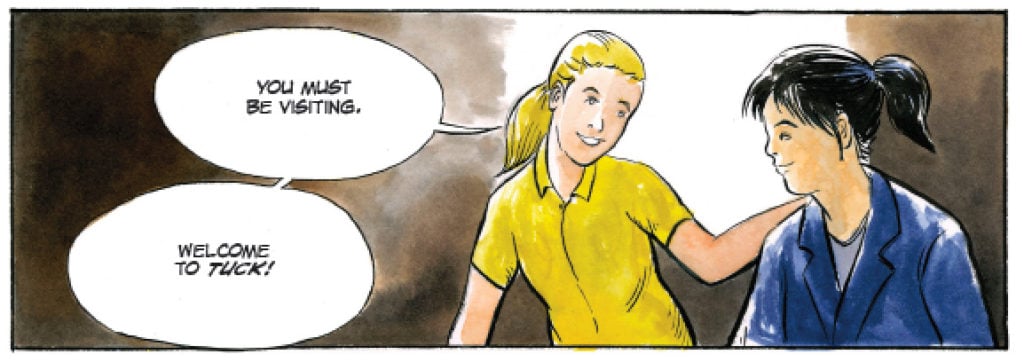
Luckily, you can talk about almost anything in these personal essays. Applicants will often discuss relationships with friends and mentors. Others might talk about the hardships they overcame or difficult experiences. However, there are some things to avoid which we discus here: 4 Mistakes Applicants Make when Writing the Personal Essay .
At the core, your business school personal statement should serve to illuminate who you are as a person and demonstrate that you live according to a code that is in line with your target business school’s own approach to education.
Yaron Dahan on the Importance of Your Story:
Mba application essay #2: the career goals essay.
Business school admissions committees want you to have a good job when you graduate from their MBA program. This is for three reasons:
- Business schools want their employment report to look good! That means that a very high percentage of graduates receive job offers (currently 98.4% at Wharton , for example), and those jobs have high compensation.
- Business schools want you to get not just “a job”, but a job that you really want. Satisfied students who achieved their goals are likely to promote the school to other potential students and speak well of the program.
- Business schools hope for (some of) their graduates to make enough money to eventually become donors.
Even though getting a good job is important, this isn’t everything. In order to stand out from other candidates, the job needs to be a bit inspiring as well. If you are not ambitious enough in outlining your goals and the impact you want to make in your future career, it is possible to come across as a boring candidate who is more or less content to stay in their current position with slightly better pay. Business schools will likely take a hard pass on those applicants. That said, if you are not somewhat realistic with what you want to accomplish, you can end up sounding naïve or unserious.
The goal here is to walk the line between the two. It is your job to convince the school that you have goals which are meaningful, but also grounded in your past experiences and considered enough that your success is assured.
To hear more on this, check out: Career Goals for MBA Essay Writing and More .
Demonstrating School Fit
After you state your goals, you’ll also need to explain how the MBA is a necessary part of achieving those goals. This is a chance to show that not only do you need an MBA , but that the particular program you’re applying to is exactly the right fit with your development needs.
What MBA programs really want to know is that you have done your homework and researched the school in detail. Admissions officers DON’T want to see copy/paste from the course catalogue. It is important to network with schools beforehand and then use what you learned to show that only their institution really has the resources to make your goals a reality.
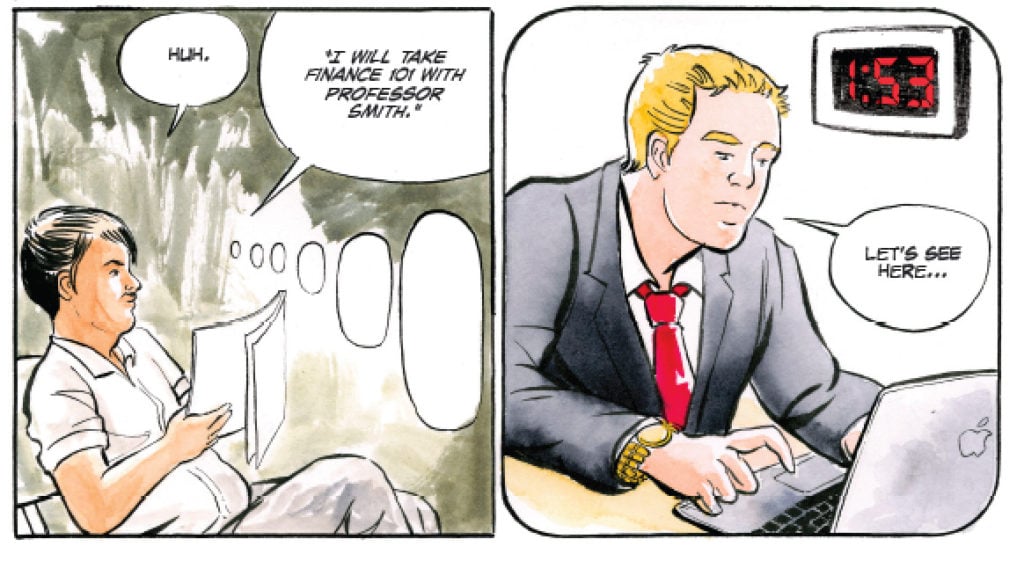
Rebecca Heath Anderson on Researching Career Goals:
Mba application essay #3: school participation essay.
Business schools are selfish! They want to know that you will add something to their institution by attending. Schools rely on students to run many programs, such as professional clubs, and want to know that you will be an active participant in the campus culture. In fact, MBA programs tend to do almost every class and activity in groups.
In order to answer questions like these effectively, you will need to map out the kinds of school-sponsored clubs, conferences, and activities in which you are interested in participating. Consider where you can make helpful contributions to campus life: how can you benefit your classmates as well as the school as a whole?
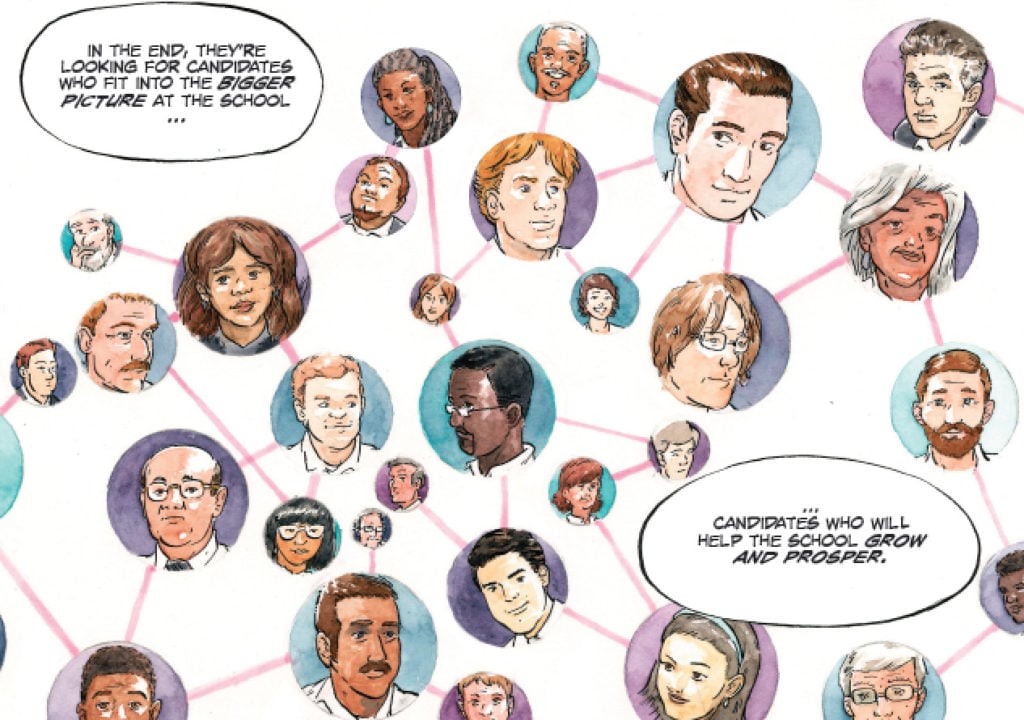
MBA Application Essay #4: Behavioral Essays
An MBA program might ask about your previous experiences, both to gauge whether you’re ready to benefit from the school’s leadership development programs and to know your moral values as a leader. These questions can come in a number of forms.
They might prompt you by saying “Tell us about a time when you led a team” or even “Tell us about a time when you failed.”
What schools really are looking for, in this instance, is some sign that you are self-reflective. They want to understand that you have experienced some leadership setbacks that have made you interested in and prepared to take in the knowledge they have to offer.
Early Birds Toolkit
Learn 3 Steps You Should Take NOW to Improve Your Profile for R1 2024
In MBA admissions, starting early can significantly boost your chances.
But there are no shortcuts, and while R1 2024 deadlines might seem far off, building your profile takes time.
Our Early Birds Toolkit has everything you need to get started right now —leave your name and email, and we’ll send you three actionable steps to elevate your profile, plus time-saving tools for faster progress.
MBA Leadership Essays and How to Write Them
What makes you a strong leader? This can be a difficult question to answer. If you have a lot of leadership experience, your challenge is to tell your story in a compelling and authentic way. And if you don’t have a lot of leadership experience, your task is to be creative about how you answer the prompt, so that you can demonstrate to admissions committees the type of leader you’ll be.
In both cases it’s important not to exaggerate the truth. As soon as you inflate what your actual experience was, you call into question not only your response to the leadership question, but also the truthfulness of the rest of your application.
When shaping a response to the leadership question, you should first think about all of the people you interact with at your job: your manager, colleagues, team members of other departments, office staff, and HR. Consider your role on this team, and what your contributions were.
If you truly had a leadership role, reflect upon your experiences—good and bad—in leading a team. Admissions committees want to see not just your successes, but also your resilience and ability to learn from mistakes. If you weren’t the leader, you can pull from examples of good leadership that you have encountered, and demonstrate how you embody those skills, perhaps by describing non-work-related leadership positions you have held.
Questions to Consider for Leadership Essays
When developing your response to the leadership question, it is important to provide as many specifics as possible—particularly in your earliest drafts. Here are some questions that can help you make your essay convincing and engaging. (You don’t necessarily need to answer all of them; they are just a starting point.)
- What did you do in your role to fix problems?
- How did you handle situations where you had to escalate the issue to management?
- How did you work with people who weren’t members of your team? How did you get what you needed, even from people who couldn’t care less about you?
- If everyone in the office was down, what did you do to perk people up?
- Did you ever informally mentor junior colleagues?
- What fears or problems did you overcome in order to lead successfully?
Writing about Difficulties, Failures and Weaknesses
A common question in MBA essay prompts concerns a failure or setback in your career. These are a few examples of essay prompts that top MBA programs have used to ask about this topic:
- Tell us three setbacks you have faced.
- Describe a situation taken from your personal or professional life where you failed. Discuss what you learned.
- Discuss a time when you faced a challenging interpersonal experience. How did you navigate the situation and what did you learn from it?
These can be unpleasant topics to write about. How should an applicant respond to questions like these?
Pick a Genuine Failure or Weakness
Although it may seem tempting to tell a story in which your own failures are minimized, this type of response is unlikely to be effective, because it does not give you the chance to show self-reflection and personal growth. Moreover, an example where you give a ‘faux failure’ is much less likely to engage the reader than one where you describe a genuine failure of setback.
For example, imagine that you decided to write about an important project that failed due to an error by someone in the team you supervised. You may be tempted to write that “the team member was unable to take the responsibility and should have been monitored more closely.” Although this may be part of the story, a better response would include some reflection on your personal contribution to the problem. Instead of giving the trite insight that you should have monitored the team more carefully, you could write about the shortcomings in your management style and ability to motivate the team. By doing this, you show that you are honest and able to to reflect on failures, and you give yourself the chance to go on to describe what you have learned.
Don’t Turn a Failure Essay Into an Achievement Essay
For instance, in the above example, do not draw the attention away from your failure in managing the team by pointing out how hard you worked on the project yourself. You do not want to give the application committee the impression that you only want to talk about your successes, but are reluctant to reflect on your weaknesses.
Describe What You Learned
End your essay by describing what you have learned from your failure or setback and give an example of how you used your new insight. This is an expected topic even if it is not mentioned in the text of the prompt.
An average essay draws trite lessons. Sticking again with the example above, you might write that “each team member has a unique style and should be motivated accordingly.” A better response includes more details: Why did you fail to connect with the problem team member? Were there warning signs that you could have seen? A great response includes an example where you put your fix into action: you can mention, for instance, how you worked successfully with the same team member on a later project or were able to spot a potential problem early on in another team you managed afterwards.
By taking the courage to write honestly and directly about your failures, and then showing how you have put your learnings into action after the failure, you will have tackled this difficult essay topic successfully.
Now that we have looked at the main categories of MBA essays, let’s talk about one of the persistent myths about the MBA application process: using example essays and templates.
MBA Essay Examples and Templates–A Bad Idea
It is tempting to think that you can model your business school essay off of someone else’s successful essay. People spend time and money searching for “the perfect MBA essay sample” to use as a guide. First, you may hope to avoid the effort of having to write the essay yourself. Second, this is the sort of cargo cult thinking that says: if I copy what a successful applicant did, then I will also be admitted.
The truth of the matter is that sample essays don’t work. People get admitted to MBA programs for many reasons. Menlo Coaching has bought and reviewed several editions of the Harbus Essay Guide , which contains a number of successful HBS essays… and some of the essays therein are absolutely terrible. One essay spent its entire length bragging about the writer’s vast family wealth and all the celebrities the writer knew. Clearly, that applicant did not get in on the merits of their essay-writing skills.
Former HBS director of admissions Dee Leopold famously said that “Applying to Harvard is not an essay writing contest.” As per our MBA applications and admissions guide , people are accepted to MBA programs not on the quality of the writing, but on the quality of the thinking that went into the essay. As a result, “the perfect essay” is actually the one that answers the question based on your perspective and experiences.
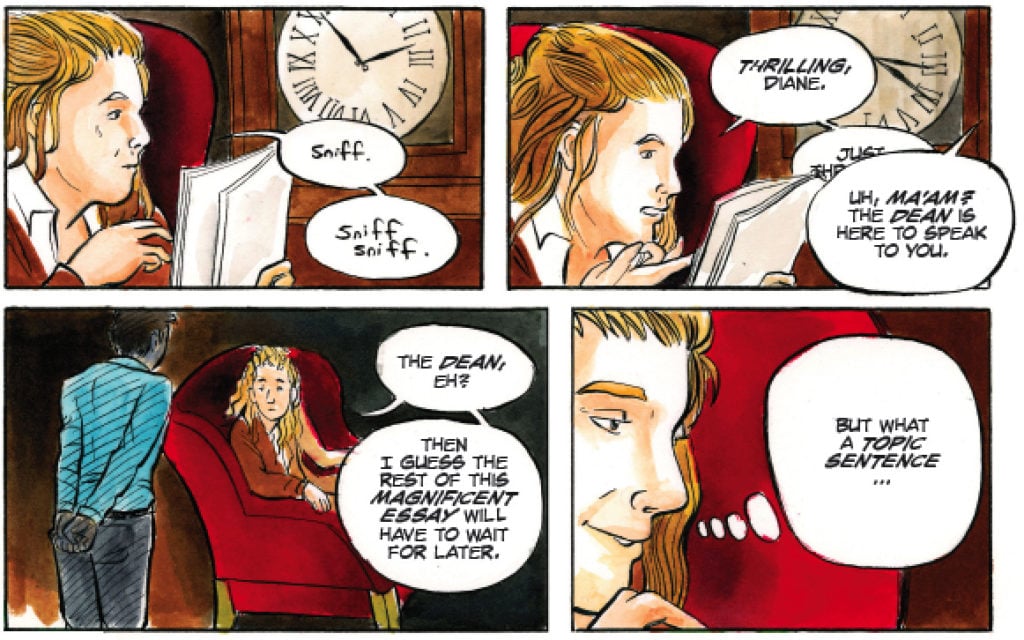
By focusing on these broad categories, you can avoid some of the pitfalls of the essay writing process. Try to keep in mind what your overall MBA story is and don’t get lost in some of the things that don’t matter, such as “sample essays” or figuring out the exact language you are going to use.
Remember, the best application essay is the one that addresses the question in a way that is tied in to your personal experience.
Discover what sets standout MBA application essays apart from the crowd with expert guidance from our experienced MBA admissions consulting team .
Read more on MBA essays
- Taking the Stress out of the MBA Essay Writing Process
- Best strategies for the Harvard MBA Essay
- What Matters Most: Conquering the Stanford GSB Essay A
- Give & Take in the Wharton MBA Essays
- Exam Prep >
- Prepare for Business School >
- Business School & Careers >
- Explore Programs >
- Connect with Schools >
- How to Apply >
- Help Center >
Every journey needs a plan. Use our Career Guide to get where you want to be.
Creating an account on mba.com will give you resources to take control of your graduate business degree journey and guide you through the steps needed to get into the best program for you.
- About the Exam
- Register for the Exam
- Plan for Exam Day
- Prep for the Exam
- About the Executive Assessment
- Register for the Executive Assessment
- Plan for Assessment Day
- Prepare for the Assessment
- NMAT by GMAC
- Shop GMAT Focus Official Prep
- About GMAT Focus Official Prep
- Prep Strategies
- Personalized Prep Plan
- GMAT Focus Mini Quiz
- Executive Assessment Exam Prep
- NMAT by GMAC Exam Prep
Prepare For Business School
- Business Fundamentals
- Skills Insight
Business School & Careers
- Why Business School
- Student Experience
- Business Internships
- B-School Go
- Quiz: Are You Leadership Material?
- MBA Return on Investment (ROI) Calculator
- Estimate Your Salary
- Success Stories
- Diversity and Inclusion
- Women in Business
Explore Programs
- Top Business School Programs
- Quiz: Which Post Graduate Program is Right for You?
- Quiz: Find the Best Program for Your Personality
- Business School Rankings
- Business Master's Programs
- MBA Programs
- Study Destinations
- Find Programs Near Me
- Find MBA Programs
- Find Master's Programs
- Find Executive Programs
- Find Online Programs
Connect with Schools
- About GradSelect
- Create a GradSelect Profile
- Prep Yourself for B-School
- Quiz: Can You Network Like An MBA?
- Events Calendar
- School Events
- GMAC Tours Events
- In-Person Events
- Online Events
How to Apply
- Apply to Programs
- The Value of Assessments
- Admissions Essays
- Letters of Recommendation
- Admissions Interviews
- Scholarships and Financing
- Quiz: What's Your Ideal Learning Style?
Help Center
- Create Account
- How To Apply
Top Five Tips for Writing Compelling MBA Admissions Essays
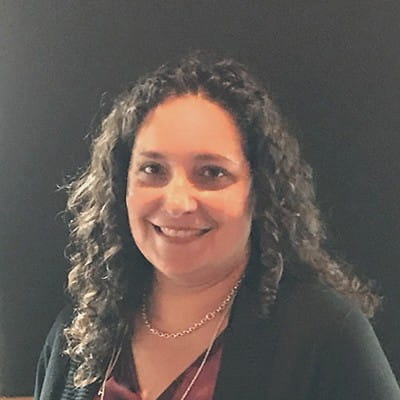
Erin Wand - Personal MBA Coach
Erin Wand is an mba.com Featured Contributor and the Vice President of Marketing and Operations for Personal MBA Coach , a boutique MBA admissions consulting and tutoring firm.

For many of the business school applicants I work with, the MBA admissions essay is the part of the application they dread the most.
Does that sound like you? It doesn’t have to be! If you’re unsure about how to start on your MBA admissions essays, don’t worry. This is your opportunity to move beyond your GMAT exam scores , GPA, or resume and reveal something deeper about yourself to the admissions committee. Read along for my best MBA admission essay tips.
Crafting winning MBA admissions essays
The question is: how to you write MBA admissions essays for top-tier programs that stand out from the stack and effectively tell your story? Here are five tips for compelling essays that will stick in the minds of the admissions committee and help you get into your top choice business school program.
1. Stay focused and answer the question asked
It’s surprising how often candidates write beautiful essays but do not answer the question. While I certainly endorse thinking outside of the box and considering the “why” behind an essay prompt, first and foremost you must answer the question.
Business school applicants like you are often highly accomplished, and it can be tempting to try to include as many of the details of your accomplishments as possible into your essays. It’s crucial that you avoid this urge and focus on the specific question at hand.
2. Less can be more: be succinct
A trend I’m seeing at many leading full-time MBA programs is shorter essay word limits. Michigan Ross , Stanford GSB , UCLA Anderson , and Duke Fuqua are just a few of the programs that have reduced their essay word counts in recent admissions cycles. This trend underscores a key piece of advice: be succinct!
Remember, your essays and short answers are just one part of your application. In addition to the details you’ll provide on the application form itself, you’ll also submit an MBA resume ( check out my resume tips here! ). This allows admissions committee members ample opportunity to read about everything you have accomplished, all the roles you have held, and the awards you have won. There is no need to fit every detail into your essays.
Instead of squeezing in as much as you can, focus on sharing a few key highlights, peppering in some interesting details, and convey your authentic voice through your writing. This is your chance to explain your choices, show your accomplishments, and share your passions. The fewer things you try to cover in your essays, the more you will be able to achieve this objective.
3. Be authentic, not what you think schools want to hear
I can’t emphasize this enough: do not write what you think admissions committee members want to read! The qualities and experiences that make you unique are your greatest selling points. Each essay should paint a clear picture of who you are, what motivates you, and what you’re passionate about.
Related to this, don’t feel compelled to show how you fit the mold that seemingly makes up the “ideal” candidate. If you have no desire to run a non-profit, that’s okay! If you’re not motivated to save the planet, don’t pretend you are! The admissions committee will see right through this, and you could end up doing more harm than good. Instead, focus your energy on simply being authentic.
4. Keep your language approachable and focus on the “so what?”
The terms you regularly use at the office may be foreign to others, including admissions committee members. When in doubt, do not assume the reader is familiar with everything about your job. Admissions directors come from all backgrounds and fields and are not assigned to candidates with similar backgrounds. They do not know the ins and outs of your industry and do not need to. In fact, details and accomplishments that are significant only to someone in your industry are less compelling than understandable results and transferable skills.
Everyone from your grandmother to a professor of microfinance should be able to understand your essays. So even if your accomplishment would be extremely impressive to another engineer or investment banker, if the reader doesn’t understand the “so what,” you’re wasting your words.
5. Limit the amount of flowery prose
Remember: You’ re not submitting your essays for a Pulitzer Prize. All you’re trying to do is tell your story. While of course you want your essays to be well-written and free of grammatical mistakes and typos, you also want them to be relatable and easy to follow. They should also convey why you are someone others would want to study with, learn from, and eventually be inspired by. That type of person is human and down to earth. Your essays should show this.
Erin Wand is an mba.com Featured Contributor and the Vice President of Marketing and Operations for Personal MBA Coach , a boutique MBA admissions consulting and tutoring firm.
Founded by a Wharton MBA and MIT Sloan graduate who sits on the Association of International Graduate Admissions Consultants Board of Directors, Personal MBA Coach has been guiding clients for 14 years and is consistently ranked #1 or #2, currently holding the #1 ranking in the US on Poets&Quants.
We help clients with all aspects of the MBA application process including early planning, GMAT/GRE/EA tutoring, application strategy, school selection, essay editing and mock interviews. Our team includes a former M7 admissions director and former M7 admissions interviewers.
Last year, our clients earned more than $6M in scholarships!
GMAT Prep Online Guides and Tips
7 tips for writing a winning mba application essay.
Nervous about your MBA admissions essay? You’re not alone! Many applicants wonder how to put their best foot forward in a business school entrance essay.
In this article, I’ll tell you what admissions committees look for in application essays and offer MBA essay tips on how to make yours stand out. We’ll also take a look at the different kinds of business school essays and a few examples of MBA essay prompts.
Why Do Business Schools Ask for Essays? What Do They Look For?
Business schools ask for essays for several reasons, all of which help admissions committees determine whether you have the skills and traits to succeed in an MBA program.
First, MBA admissions committees want to see how you write. Communication skills—including concision, clarity, style, and fluency in English—will be essential to your success in business school. One way of discerning your level of writing ability is to require an original writing sample. In an MBA essay, you have to get your point across straightforwardly, elegantly, and concisely; being able to do this is a key element of succeeding in business school and the world of business in general.
Also, MBA admissions committees want to get a sense of who you are on a more personal level. MBA application essays tell admissions officials about you not only through what you say, but in how you say it. Are you self-aware, for example, and can you reflect on past challenges or mistakes in a thoughtful way? Do you demonstrate insight into who you are and your goals? How you answer questions about yourself, your career, and your journey can help MBA admissions officials discern your level of critical thinking and personal insight.
Not sure how or what to study? Confused by how to improve your score in the shortest time possible? We've created the only Online GMAT Prep Program that identifies your strengths and weaknesses, customizes a study plan, coaches you through lessons and quizzes, and adapts your study plan as you improve.
We believe PrepScholar GMAT is the best GMAT prep program available , especially if you find it hard to organize your study schedule and don't want to spend a ton of money on the other companies' one-size-fits-all study plans.

You can have countless accomplishments, but to succeed in business school, you’ll also need to fit in with the campus climate, work well with your peers, and contribute to campus diversity in a meaningful way. The MBA essay is a place for you to talk about the background or experiences you have that are unique to you and that you believe could differentiate you from your colleagues and/or provide a fresh perspective to campus.
Finally, essays are a way for you to showcase the qualities that most MBA programs say they are looking for in applicants, such as leadership skills, community involvement, problem-solving skills, communication skills, clear goals, and a strong sense of ethics. Some of these traits might not be readily apparent from a resume alone, and an MBA essay can be a place for you to elaborate on how you’ve cultivated them in yourself.

MBA Entrance Essay Sample Prompts
Most MBA entrance essays ask you about one of several things. Many of them are variations on similar questions: the open-ended question, the leadership question, the personal growth question, questions on short- and long-term academic and career goals, and the diversity question. For each one, I’ll give an example of a real MBA essay prompt from 2016 or 2017.

#1: Open-Ended
The open-ended MBA application essay question is just that: open. It allows you to tell your own story, giving you quite a bit of freedom but also little to no guidance. For that reason, many applicants find it to be the most challenging MBA essay prompt.
Harvard Business School has only one essay for its MBA application, and it’s the quintessential open-ended MBA essay question. This is the prompt for 2017-2018 applicants.
As we review your application, what more would you like us to know as we consider your candidacy for the Harvard Business School MBA program?
Note that, as in other open-ended MBA admission essay prompts, this question asks you to decide what you’ll write about. Successful Harvard applicants and HBS admissions counselors have advised applicants to use the prompt as a chance to demonstrate their past use of an especially desired trait, such as problem-solving skills. For example, many successful applicants use the prompt to describe a scenario in which they faced and overcame a challenge, especially as a leader or alongside a team.
Notably, Harvard also doesn’t list a word limit, so you can decide the appropriate length for your essay. However, most admissions counselors will advise you to keep it concise and straightforward.
#2: Leadership
Another common MBA essay prompt asks you to demonstrate your experience and skills as a leader. Leadership qualities are listed by nearly all MBA admissions counselors as fundamental to a career in business and, thus, to a successful business school application.
Let’s look at a sample leadership MBA essay prompt from Kellogg.
Leadership and teamwork are integral parts of the Kellogg experience. Describe a recent and meaningful time you were a leader. What challenges did you face, and what did you learn? (450 words)
In a response to this kind of prompt, you should be as specific as possible. Name the company you were working for or specifically describe the project you were heading. Who was on your team? What were your objectives? Did you meet them? How could you have done so more effectively?
While you shouldn’t be overly self-deprecating, don’t be afraid to address the challenges you met and how you overcame them (or would overcome them now, with more experience and knowledge). Remember that one important aspect of leadership is accountability, so if there were problems, don’t solely blame your team for them. Instead, reflect on how you successfully worked with your team to solve the problems, and/or on how you could have done so more effectively or efficiently.
#3: Personal Growth
The personal growth MBA admission essay prompt will ask you how you’ve changed in the past and how you want to grow in the future. Here’s one example from the Northwestern University Kellogg School of Management.
Pursuing an MBA is a catalyst for personal and professional growth. How have you grown in the past? How do you intend to grow at Kellogg? (450 words)
Don’t be afraid to get a bit personal with these kinds of prompts . They’re meant to gauge something about your personality and who you are, rather than only what you’ve done.
Many successful MBA admission essays that respond to these kinds of questions follow a past/present/future format. Ask yourself what traits you’ve gathered over the years that have benefited you personally and professionally, how you’ve improved, and what you’ve learned. What experiences have shaped you? Be as specific as possible.
Want to improve your GMAT score by 60 points?
We have the industry's leading GMAT prep program. Built by Harvard, MIT, Stanford, and Wharton alumni and GMAT 99th percentile scorers, the program learns your strengths and weaknesses and customizes a curriculum so you get the most effective prep possible.

Then, take stock of yourself now: your career, your education, and where you see yourself in the future. What do you need in order to get there?
Finally, most essay MBA prompts in this vein (like Kellogg’s) will ask you how they can help you move towards that personal or professional goal. Be as specific as you can, focusing on the particular strengths of the prospective MBA program and how they match up with what you want to improve about yourself as a person, colleague, and leader.

#4: Your Plan
Some MBA application essay prompts will ask you about your career goals and how attendance at a particular business school will help you to achieve them. Let’s look at one from the USC Marshall School of Business.
Essay #1 (Required) – What is your specific, immediate short-term career goal upon completion of your MBA? Please include an intended position, function, and industry in your response. (word limit: 100)
As you can see, questions like these often request brief responses. So get straight to the point, and give details. Name a specific job you’d like to hold, what you’d like to do there, and even particular companies if you can.
Questions like this one will require some research. Research alumni from your prospective business school who’ve ended up in positions comparable to ones you’d like to hold in the future, particular companies and positions that match up with your personal and professional goals, and specific coursework or industry experiences offered by your prospective business school that would help you get there.
#5: Diversity, Culture, and Community
Finally, some MBA essay prompts will ask you how your unique background and experiences would contribute to the overall diversity and collegial atmosphere of a school’s campus climate and community. Here’s one example from USC.
Essay #2 (Required) – At Marshall, we take pride in the fact that our students work collaboratively, both inside and outside the classroom, to create a culture, a community, and an environment that truly defines what we call the Trojan Family. Please describe the contributions you expect to make to your classmates during your time at USC. How will they benefit from your presence in the program? (word limit: 500)
You can respond to questions like this, depending on the wording of the original prompt, by discussing your cultural background, identity, and/or personal experiences that have given you particular insight into a given community or that have lent you a unique perspective that could be valuable to your colleagues as you collaborate.
You can also discuss past community service projects or issues you’re passionate about and how you plan to carry those experiences and passions into your work at your prospective MBA program.

7 MBA Essay Tips
Writing MBA essays takes a particular skill set. Let’s go over the top seven MBA essay tips for making your application essay shine.
Want to Identify YOUR GMAT Strengths and Weaknesses?
Our proprietary GMAT Diagnostic Assessment creates a customized study plan for you that takes you from registration all the way to test day! It is included with every account and proven to significantly maximize your score .
Get your personalized assessment as part of your 5 day risk-free trial now:

#1: Write Early and Often
Even though MBA entrance essays are brief, they take a lot of polishing. Writing MBA essays takes time.
Don’t expect to write yours at the last minute or knock out a quality essay in a day. Most students need several drafts to make sure they’re getting their points across as elegantly and clearly as possible.
Start your essay well before the application deadline, when you don’t yet feel any pressure. For several weeks, don’t try to write at all. Instead, before crafting your essay for MBA admission, take notes on your past, present, and future. What have you learned? What unique experiences have you had? What have been the most meaningful projects you’ve undertaken? Ask friends, family, and mentors to tell you what they value most about you or what they see as your greatest personal and professional assets.
Only once you’ve gathered this material should you begin your first draft of your MBA application essay. Start with an outline for each one that includes the story you want to tell and the main points you want to get across.
Once you have a clear outline, you can start drafting. Taking the writing process seriously from start to finish will give you a much better product in the end than trying to write something hastily right before the deadline.
#2: Show, Don’t Tell
MBA admissions committees want to be able to tell that you have the qualities that are necessary to succeed in business school, such as leadership skills and integrity.
Your MBA admissions essay can be a great place to showcase those qualities. However, remember to show, not tell. Saying “I have strong leadership skills” doesn’t tell an admissions committee much. Through an anecdote about, say, meeting a difficult deadline or overcoming an obstacle, a reader should be able to tell that you have the qualities of a strong leader without your having to say so explicitly.
#3: Research Your Goals
When describing your future goals, be as specific as possible. Business schools know that your goals may change in the future, but stating specific goals now will show that you’ve done your research and have an idea of what you want and how an MBA program can help you get there.
Before writing your essay for MBA admission, research the ins and outs of the industry you want to enter, the position you’d like to have, companies you might like to work for, and coursework and internships or fieldwork that could aid you on your way to those goals.
#4: Keep It Concise
Never, ever go over a stated word count limit when you’re writing your essay for MBA admission. It might be tempting, but business schools want to see that you can get your point across concisely and straightforwardly.This rule goes for MBA essay prompts that don’t have specific word counts, too: sometimes, less is more.
One of the biggest mistakes applicants make in writing an essay for MBA admission is to use too much flowery language to come across as more professional. If you do this, it can be distracting and cause the admissions committee to miss the main points you’re making.
Bottom line, trim anything extraneous from your essay —that is, anything that doesn’t actively support the main point(s) you’re trying to get across.

#5: Show Self-Awareness
It might feel tempting to use the MBA admission essay as a space to list all of your accomplishments (and since your resume is already part of your application, this is unnecessary), but MBA admissions committees would rather see that you have insight into both your strengths and weaknesses. No one is perfect, and in your essay for MBA admission, you shouldn’t try to come across as if you’ve never made a mistake or faced a challenge that you’ve had to learn from.
Also, in business school and the business world at large, bouncing back from failures, being flexible, and problem solving are all essential skills. All of them require a thick skin and awareness of what you could do better.
Of course, this doesn’t mean that you shouldn’t showcase your achievements, but if you’re asked about personal growth or an obstacle you’ve overcome, be clear about what you could have done more effectively in the past (at a job or in your education, for example) and the steps you’ve taken or will take to sidestep that mistake in the future.
#6: Share Your Personal Journey
Many applicants would prefer to focus only on their professional backgrounds and goals in their MBA essays, but you shouldn’t be afraid to get personal in your essay. You don’t need to tell your whole life story, but especially in response to questions that ask about your growth over time, you should showcase your personality and give the admissions committee an idea of your personal background and experiences.
#7: Ask for Edits
It might seem obvious, but many applicants don’t do it: proofread your work! When writing MBA essays, revision is key. Turning in an MBA essay with typos and other errors will come off as thoughtless and unprofessional.
You should also get a second (and, perhaps, a third and fourth) pair of eyes on your essay to make sure it’s coming across as you want it to. Going through several rounds of drafts is a necessary part of the writing process to ensure that you’re putting your best foot forward in your MBA entrance essay.
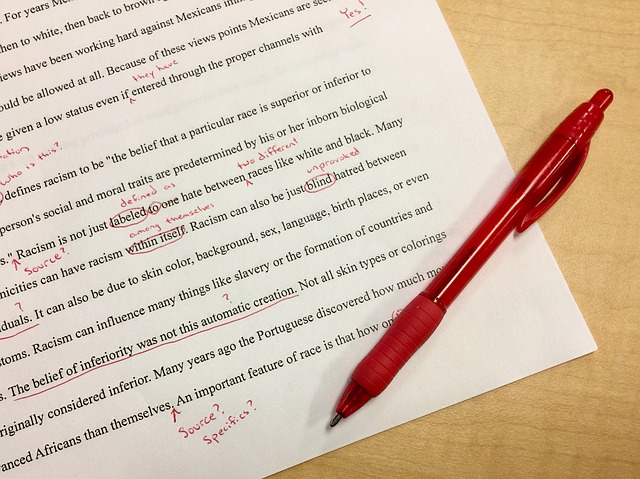
What’s Next?
Worried about how your GMAT score matches up to other applicants’? Find out more in our list of average GMAT scores by school.
Concerned about your chances of getting into an MBA program? Our guide to business school acceptance rates will help.
Ready to apply to business school? Check out our top eight tips for applying to MBA programs here.
Was this helpful? Sign up for FREE GMAT and MBA guides!
Share this:.
- Click to share on Twitter (Opens in new window)
- Click to share on Facebook (Opens in new window)
- Click to share on Google+ (Opens in new window)
Author: Laura Dorwart
Laura Dorwart is a Ph.D. student at UC San Diego. She has taught and tutored hundreds of students in standardized testing, literature, and writing. View all posts by Laura Dorwart

50 MBA Essays That Got Applicants Admitted To Harvard & Stanford
- Share on Facebook
- Share on Twitter
- Share on LinkedIn
- Share on WhatsApp
- Share on Reddit
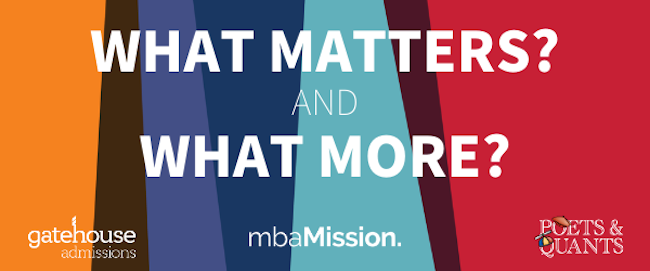
What Matters? and What More? is a collection of 50 application essays written by successful MBA candidates to Harvard Business School and Stanford Graduate School of Business
I sat alone one Saturday night in a boardroom in Eastern Oregon, miles from home, my laptop lighting the room. I was painstakingly reviewing a complex spreadsheet of household energy consumption data, cell by cell. ‘Why am I doing this to myself? For remote transmission lines?’…I felt dejected. I’d felt that way before, during my summer at JP Morgan, standing alone in the printing room at 3 a.m., binding decks for a paper mill merger that wouldn’t affect my life in the least.
That’s how an analyst at an MBB firm started his MBA application essay to Stanford Graduate School of Business. His point: In a well-crafted essay, he confronts the challenge of finding meaning in his work and a place where he can make a meaningful difference. That is what really matters most to him, and his answer to Stanford’s iconic MBA application essay helped get him defy the formidable odds of acceptance and gain an admit to the school.
Getting into the prestigious MBA programs at either Stanford Graduate School of Business or Harvard Business School are among the most difficult journeys any young professional can make.
NEARLY 17,000 CANDIDATES APPLIED TO HARVARD & STANFORD LAST YEAR. 1,500 GOT IN
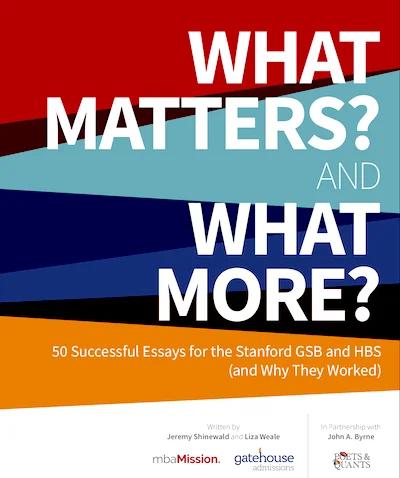
This collection of 50 successful HBS and GSB essays, with smart commentary, can be downloaded for $60
They are two of the most selective schools, routinely rejecting nine or more out of every ten applicants. Last year alone, 16,628 candidates applied to both schools; just 1,520 gained an acceptance, a mere 9.1% admit rate.
Business school admissions are holistic, meaning that while standardized test scores and undergraduate transcripts are a critical part of the admissions process, they aren’t the whole story. In fact, the stories that applicants tell the schools in the form of essays can be a critical component of a successful application.
So what kinds of stories are successful applicants to Harvard and Stanford telling their admission officers? For the first time ever, a newly published collection of 50 of these essays from current MBA students at these two schools has been published. In ten cases, applicants share the essays they wrote in applying to both schools so you can see whether they merely did a cut-and-paste job or approached the task anew. The 188-page book, What Matters? and What More?, gains its title from the two iconic essay prompts at Harvard and Stanford.
THOUGHTFUL CRITIQUES OF THE ESSAYS
Stanford can easily boast having the most difficult question posed to MBA applicants in any given year: In 650 words or less, candidates must tell the school what matters most to them and why. Harvard gives applicants ample room to hang themselves, providing no word limit at all, “What more would you like us to know as we consider your candidacy?”
One makes this unusual collection of essays powerful are the thoughtful critiques by the founders of two MBA admissions consulting firms, Jeremy Shinewald of mbaMission and Liza Weale of Gatehouse Admissions. They write overviews of each essay in the book and then tear apart portions by paragraphs to either underline a point or address a weakness. The book became available to download for $60 a pop.
As I note in a foreword to the collection, published in partnership with Poets&Quants, the essay portion of an application is where a person can give voice to who they are, what they have achieved so far, and what they imagine their future to be. Yet crafting a powerful and introspective essay can be incredibly daunting as you stare at a blank computer screen.
APPLICANTS OPEN UP WITH INTIMATE STORIES THAT SHOW VULNERABILITY
One successful applicant to Harvard Business School begins his essay by conveying a deeply personal story: The time his father was told that he had three months to live, with his only hope being a double lung transplant. had to undergo a lung transplant. His opening line: “Despite all we had been through in recent years, I wasn’t quite sure what to expect when I asked my mother one summer evening in Singapore, ‘What role did I play during those tough times?’”
For this candidate to Stanford Graduate School of Business, the essay provided a chance to creatively engage admission readers about what matters most to him–equality-by cleverly using zip codes as a hook.
60605, 60606, 60607.
These zip codes are just one digit apart, but the difference that digit makes in someone’s life is unfathomable. I realized this on my first day as a high school senior. Leafing through my out-of- date, stained, calculus textbook, I kept picturing the new books that my friend from a neighboring (more affluent) district had. As college acceptances came in, I saw educational inequality’s more lasting effects—my friends from affluent districts that better funded education were headed to prestigious universities, while most of my classmates were only accepted by the local junior college. I was unsettled that this divergence wasn’t the students’ doing, but rather institutionalized by the state’s education system. Since this experience, I realized that the fight for education equality will be won through equal opportunity. Overcoming inequality, to ensure that everyone has a fair shake at success, is what matters most to me.
HOW AN APPLICANT TO BOTH SCHOOLS ALTERED HIS ESSAYS
Yet another candidate, who applied to both Harvard and Stanford, writes about being at but not fully present at his friend’s wedding.
The morning after serving as my friend’s best man, I was waiting for my Uber to the airport and—as usual—scrolling through my phone,” he wrote. “I had taken seemingly hundreds of photos of the event, posting in real time to social media, but had not really looked through them. With growing unease, I noticed people and things that had not registered with me the night before and realized I had been so preoccupied with capturing the occasion on my phone that I had essentially missed the whole thing. I never learned the name of the woman beside me at the reception. I could not recall the wedding cake flavor. I never introduced myself to my friend’s grandfather from Edmonton. I was so mortified that before checking into my flight, I turned my phone off and stuffed it into my carry-on.
The Stanford version of his essay is more compact. In truth, it’s more succinctly written and more satisfying because it is to the point. By stripping away all but the most critical pieces of his narrative, the candidate focuses his essay entirely on his central point: the battle of man versus technology.
Even if you’re not applying to business school, the essays are entertaining and fun to read. Sure, precious few are New Yorker worthy. In fact, many are fairly straightforward tales, simply told. What the successful essays clearly show is that there is no cookie-cutter formula or paint-by-the-numbers approach. Some start bluntly and straightforwardly, without a compelling or even interesting opening. Some meander through different themes. Some betray real personality and passion. Others are frankly boring. If a pattern of any kind could be discerned, it is how genuine the essays read.
The greatest benefit of reading them? For obsessive applicants to two of the very best business schools, they’ll take a lot of pressure off of you because they are quite imperfect.
GET YOUR COPY OF WHAT MATTERS? AND WHAT MORE? NOW
Questions about this article? Email us or leave a comment below.
- Stay Informed. Sign Up! Login Logout Search for:

When To Start Your MBA Application

Six Tips For Getting Into Duke Fuqua’s MBA Program

GMAT Score: Understanding The New GMAT Focus Edition

HBS Deferred MBA: Top Tips For The 2+2 Essays
- How To Use Poets&Quants MBA Admissions Consultant Directory
- How To Select An MBA Admissions Consultant
- MBA Admission Consulting Claims: How Credible?
- Suddenly Cozy: MBA Consultants and B-Schools
- The Cost: $6,850 Result: B-School
Our Partner Sites: Poets&Quants for Execs | Poets&Quants for Undergrads | Tipping the Scales | We See Genius
- E-mail & Password
- Notification Settings
- Global Settings
- Applicant profile
- Update status
- My GMAT info
- --> My Education -->